RIPON NOTES
Evacuation. Before we broke up for the summer holidays in 1939 we had already prepared for evacuation-if it became necessary. At school our books were packed in sacks and stored in the basement; 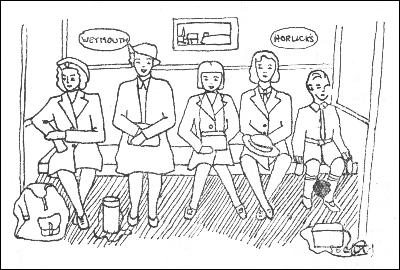 and at home we each of us had a haversack stuffed with the essentials of clothing; and food for a day. The order to prepare for evacuation came on Friday, August 25th, and many of us had to return home early from holidays to report at school. The following week we attended school daily, anxiously awaiting the signal which did come exactly a week later, on September 1st.
and at home we each of us had a haversack stuffed with the essentials of clothing; and food for a day. The order to prepare for evacuation came on Friday, August 25th, and many of us had to return home early from holidays to report at school. The following week we attended school daily, anxiously awaiting the signal which did come exactly a week later, on September 1st.
The great wheels of the Government's scheme were set in motion, and they ran with complete smoothness. Trams took us to Leeds; a train rushed us to Ripon; buses carried us from the station to a school-room in the town where we were each given "iron-rations" for the next forty-eight hours-tinned food, biscuits and chocolate. No time was lost, however, in escorting us to our billets. Some of us soon found happy homes, though a few had to spend a few days, and I may say rather uncomfortable nights, before they found permanent billets. But the friendly way in which the people of Ripon opened their homes to us was greatly appreciated at such a critical time.
B.S.
******
At Ripon. When we reported at school on the second day of our "stay" in Ripon, it seemed that school had really begun, especially as we were told "Report on Sundays." However, we were soon to realise our mistake. We had to attend school, but for the first ten days we led anything but an ordinary school-life.
Many became quite expert at solving crossword puzzles, and whenever a mistress or a girl was seen with a paper there was a rush to take it from her for the sake of the crossword puzzle. Unknown talent, too, was brought out in knitting and in embroidery. There seemed to be no one 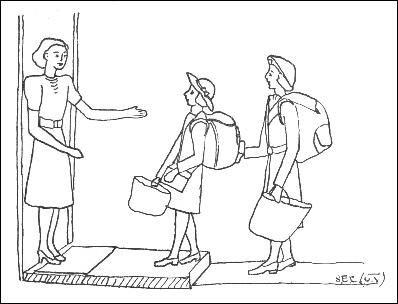 during those first days (or afterwards either) who was not armed with some kind of handwork.
during those first days (or afterwards either) who was not armed with some kind of handwork.
Of course we were all interested in the news, and many of the mistresses used to read to us from the different newspapers, with the result that we had quite a number of views. Many of us, too, met new characters from books which were also read to us. Naturally we are far too modest to say anything of the stories which we ourselves composed. Unfortunately they will never be brought to life again, because they were all oral ones, but we do assure you that they were very thrilling and quite spontaneous. You see one of us would be asked to begin and then having worked up some exciting point would hard-heartedly leave off and someone else would be asked to continue the story.
The gardens at Ripon brought forth the Botanists, for tours were made in which we (helped by the Staff) identified all the plants and trees. Those of us who were not very enthusiastic about these tours most probably made up for them in the many singing classes which we had.
A visit was paid to the Wakeman's House, and also to the little Museum in the old part of Ripon. In it we saw many relics of former days, including a torture chair, some old fashioned hats and one of the famous "penny-farthing" bicycles, to say nothing of a collection of animals.
Just to look upon the outside of the Cathedral makes one realise how wonderful it is, but when allowed to go round it as we were, and to be told all about its different arches, windows, and kinds of woodwork, by someone who knows as much about it as Dr. Moody, its organist, one feels full of admiration for it.
These are just some of the things that we did during those first ten days, but very very shortly the time came for walks, crosswords and knitting, in school time, to stop, and on Wednesday, September 13th, school really began, and we all once again settled down to work with a capital W.
E.P.
******
Fountains Abbey. One certain afternoon, before school had officially begun, we went to visit Fountains Abbey. It was a lovely afternoon, and the prospect of walking was a pleasant one.
We set off in Form groups, and soon entered some fields and a little later Studley Park. Here we kept a keen watch for wild deer which we had heard were to be seen. 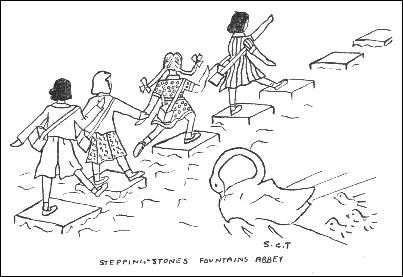 We were fortunate to see some, a little distance away, feeding under some trees.
We were fortunate to see some, a little distance away, feeding under some trees.
Shortly after this we entered the Abbey grounds. It was a pleasant walk to the Abbey with tall yew hedges on both sides, big shady trees and with the murmur of the river in our ears. Then suddenly came a wide stretch of grass and beyond was the Abbey with the river flowing behind it. At once the party broke up and everyone went to explore.
The Abbey is a Cistercian one, and dates back to 1140. It was partly destroyed by Henry VIII. But some very magnificent carvings remain, and on the outside walls figures could be seen. There were very many passages leading into the remains of some large room or some smaller one, and steps leading upwards but ending in ruins after a few feet. The fireplace in the old kitchen claimed great attention. Even a very tall person could have stood up in it. The chimney gets narrower until there is just a patch of sky to be seen, and the sky appears a long way away.
The time seemed to slip away all too soon, and we walked back to Ripon with, I am sure, the memory of a most enjoyable afternoon at Fountains Abbey.
E.Y.
******
All Hallowgate. Ah me ! Those were the days when homework was homework, there had to be no dawdling.
It was quite a large Sunday School Room - at least big enough for the Senior School - with 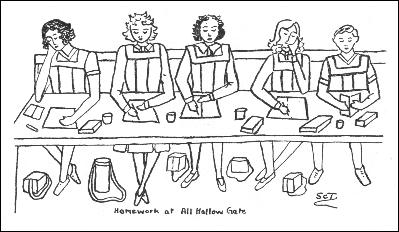 a platform at one end on which stood an obviously well used piano. Every week-day morning the Senior School trooped in, in twos and threes, and were ready for work by 9-30 a.m. We then did as much homework as had been set and spent the rest of the morning in recreation of various sorts.
a platform at one end on which stood an obviously well used piano. Every week-day morning the Senior School trooped in, in twos and threes, and were ready for work by 9-30 a.m. We then did as much homework as had been set and spent the rest of the morning in recreation of various sorts.
If walls could speak what stories those of All Hallowgate could tell! They won't forget the rehearsals for the "Lawnswood Pantomime," and perhaps they remember with a smile the time when one of the members of the Senior Choir looked for her handkerchief and found it in a most awkward place-and the scene was so pathetic.
I wonder how many letters were written and how many ounces of wool were wound? Enough for quite a time I should think. Everybody did some sort of handwork-either knitting or sewing, and many were the Xmas presents that were made there.
The very name of All Hallowgate brings back a great many pleasant memories to all of us-memories of things and incidents which helped to soften that experience-evacuation.
B.L.
******
Blossomgate Sunday School. A hall with a platform, a crowded hall full of girls, fat girls, thin girls, pretty girls and plain girls, bespectacled or otherwise. Seated on the platform are a few mistresses who keep a ceaseless watch on the girls, checking all talk, for the girls are doing their "prep." The room would be very dim were it not for the electric light which is constantly kept on. To-day the room is rather stuffy, hot air is gushing up through the grill at the back of the room, but yesterday the same hall seemed cold and draughty. You must not imagine that "prep." is the only pastime in this hall for it is not so, singing lessons, opera rehearsals and reading; letter-writing, sewing and knitting go on here. The hall is also a centre for shopping expeditions and "crocodile" walks. Girls of the Junior and Middle School will be able to look back on many a happy hour spent within its walls during our "evacuation to Ripon."
M.R.
******
Camp Fire Girls. As many of us were already Camp Fire Girls and did not wish to give it up whilst we were evacuated, we made enquiries whether there was a local Camp Fire Group that we could join. When we found that there was not one, we started a group ourselves, which was temporality affiliated to the British Camp Fire Girls' Association. The Wakuta group, with Miss Froggatt acting as Guardian, and a
varying number of members due to people arriving and drifting homewards at different times, held many happy meetings at Blossomgate on Wednesday mornings. This enabled those who were already Camp Fire girls to continue their meetings, and those to whom it was a new venture to learn something of what Camp Fire stood for.
J.L.
******
Lawnswood Guides in Ripon. One Thursday, early in October, with kind help from the Ripon Guiders, we were able to form an Evacuation Company of Guides. Mr. Hall lent us the Scout Hall for our meetings, for which we were very grateful.
Those Guides who had been Patrol Leaders in Leeds formed eight Patrols of Guides. Miss Boyd took Company Drill several times. Mrs. Crukenburg did much work with the Recruits. Miss Spence and Miss Dawson helped the older Guides who had First-class and All Round Cords to teach the young Guides Second and First Class. We played many games.
On December 7th, thirteen Tenderfoots were enrolled by Miss Smith, the Division Commissioner. We ended Guides in Ripon with party games arranged by the P.L.'s. We were very indebted to all those who had helped to give us successful meetings.
Miss Spence's Ranger Company invited a few of the older Guides to their meetings on Friday nights at the Ranger Room, where much Ranger work was done, including Nursing, Signalling-complete with buzzer, telephone, heliograph and lamp-Sea Rangering and the Ranger Pre-Enrolment Test.
S.M.C.
******
The Parties. Our stay in Ripon was made considerably happier by the friendliness shown by the girls of Ripon High School, in spite of the inconvenience we caused them. In particular they brightened some of our Saturday afternoons with a series of Form Parties which we thoroughly enjoyed. Everything possible was done to give us a happy time, and the programmes included dancing, competitions, and a most exciting treasure hunt, in which pursuit, all parts of the building were invaded without ceremony. These parties, too, afforded us an opportunity of getting to know our School hostesses better, for we saw so little of them on week-days-when it was almost a case of playing Box and Cox. They also helped to increase the store of happy memories which we brought away from Ripon. Thank you very much Ripon High School.
D.M.W.
******
The Convoy. The order comes "Join Convoy, look to torches, gas masks and luminous bands." Several convoys make their way out of harbour, each taking a different course. There is a swell as the merchant ships go forward through the darkness-there are neither light ships nor lighthouses. "Weigh anchor" comes the order, "gas mask overboard, danger ahead, holly bushes, unidentified objects to starboard." Soon after the first bell of the last dog watch the ships begin to break away for their appointed destinations, signalling grateful thanks to their leader for their safe arrival after a hazardous journey.
M.P.
******
The Lawnswood Pantomime. During the second half of the Christmas term those of the Lawnswood evacuees at Allhallowgate who were not in the choir enjoyed themselves by rehearsing an end-of-term performance-a pantomime to end all pantomimes. The story was a mixture of Cinderella, Babes in the Wood, and Aladdin, helped by Fairy Blackout who foiled the Demon King-complete with Swastika, and,
all being annoyed in their turn by a slow "sniffy" scene-shifter who wanted to palm his "fairy slipper" on to anyone who was on the stage.
Widow Twanky, complete with Yorkshire accent and mannerisms, distressed about her "evaporated" son Aladdin, adopted the 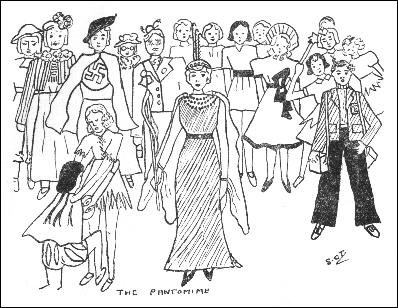 Babes in the Wood who were hunting for a billet. She also ensnared, with the aid of some not very "dainty and charming fairies", the Demon King into marriage, "a prospect drear."
Babes in the Wood who were hunting for a billet. She also ensnared, with the aid of some not very "dainty and charming fairies", the Demon King into marriage, "a prospect drear."
The course of the Prince's and Cinderella's true love "which never runs smooth", was hindered by the usual two ugly sisters, who flirted with Dandini to get an invitation for the Prince's Ball. In the belief that he was the Prince they gave a lump of their precious sugar ration to the Comic Horse, a wonderful creature who performed a marvellous dance. Cinder's gas-mask case was carried by Buttons as well as his own. He put both in charge of his audience until, when Cinders was told that she couldn't go to the ball, they were both opened and proved to contain a very squashy bun and a very floury powder puff.
The performers also showed their talent as singers by their renderings of the "Merry Villagers' Chorus", "What shall we do with our Latin Grammars", and the "Lawnswood Trot" performed in a temporary black-out in a burlesque of our "convoy" system.
This combination of stories spiced with a little local colour produced a most hilarious play-it was not until the final rehearsal that the cast could control its grins and giggles, the greatest surprise for the audience being, I think, the sight of the members of the Staff who so realistically acted their parts.
I think everyone will join me in thanking Miss Stowell, author, producer and actress, for providing us with such an enjoyable and interesting entertainment.
S.D.P.
******
"The Yeomen of the Guard." The performance of "The Yeomen of the Guard" was one way in which the school showed its appreciation of the kind welcome the people of Ripon gave to us. The production of the opera was not without difficulty, as many of the costumes had to be sent from Leeds, whilst others were quickly made with the assistance of Miss Riddoch and Dorothy Collins. The dress rehearsal, to which the girls of Ripon High School were invited, was almost a tragedy instead of a comic opera. The noble Tower of London, which had only just arrived in time from Lawnswood, collapsed on top of the Yeomen! Fortunately they were the heftiest girls in the choir, so no damage was done. No such calamity occurred at the actual performances, which were given at Blossomgate. The audiences were very appreciative, and many people were interested to see their "billet-children" under rather different conditions.
The Senior Choir was augmented by members of the Fourth Form, and all the girls played their parts well. We were very thrilled to find accounts of the opera in two papers, and a photograph in one of them. The net proceeds raised was £10, which was shared between the Red Cross and the Moral Welfare Society in Ripon.
The success of "The Yeomen" was due largely to Miss Froggatt's keen enthusiasm and help.
B.G.
******
Good-bye to Ripon. As the Autumn term drew to a close it was rumoured that Lawnswood would re-open, and that we should say good-bye to Ripon and spend Xmas at home. I am of the opinion that Thursday, December 21st-the day I was able to return home- was the happiest day I have ever spent. I got up at the usual hour, but was down for breakfast in double quick time. After breakfast I had a last look round to see if I had forgotten anything ; my friend's father arrived with his car; four of us and our luggage were packed in, and then it was full speed for home. When we arrived in Leeds I said I never wanted to leave home again; but I don't suppose I really
meant what I said.
J.B.
******
We cannot end our Ripon Notes without expressing our appreciation of all that Miss Holden and the Staff did for our comfort and well-being while we were evacuees. They were untiring in their efforts to make things go smoothly and to see that we were happy and secure. Our stay at Ripon would have been impossible without them.
B. GILL.
_____
GUILD OF HELP REPORT
In February, 1927, after a number of preliminary discussions between the Headmistress (Miss Bellman), the Staff, and the Girls, the Guild of Help of the Girls' Modern School (as the school was then called) was launched.
Before this time help had been given to many causes by groups of individuals and Forms, and the idea was to achieve a more united effort in social service.
Two of the first decisions of the new committee were to do work in connection with the Young Helpers' League, and to link ourselves with a school less favoured than our own. The Education Committee came to our help in suggesting to us South Accommodation Road Girls' School, and so our friendship began.
Over a period of twelve years we have had many happy gatherings; summer parties at our school and Christmas gatherings at theirs. It was, then, very sad news when we learned that this school was to become a Senior School, and that the July party of 1939 would have to be our "good-bye".
Unfortunately we chose a very wet day, but our spirits were undamped. We meant to have a lovely time in spite of the weather. After tea in rooms which looked very gay, over two hundred and fifty guests and hostesses divided into three groups to play indoor games in the Hall, the Gym., and the Art Room. The guests were delighted with their bunches of flowers and the sweets which they took home, and Miss Holden and Miss Wallace were equally pleased with the lovely bunches which the guests gave to them.
Our best wishes go to Miss Bartle (herself an old Modern School Girl) who has since been appointed as the Headmistress of Cowper Street Girls' School, to the Staff, and to all the South Accommodation Road girls, past and present. We hope they carry with them memories as happy as those they have left with us.
The other activities of the Guild were carried on as usual during the Summer Term, as the individual reports show. There was the usual collection of clothing from the School. The proceeds of the second collection of money for this term were sent to the fund to aid the relatives of the victims of the Thetis disaster.
In September, owing to the war and our evacuation to Ripon, many of the societies went underground, but the Guild of Help felt more determined than ever. As has already been stated the 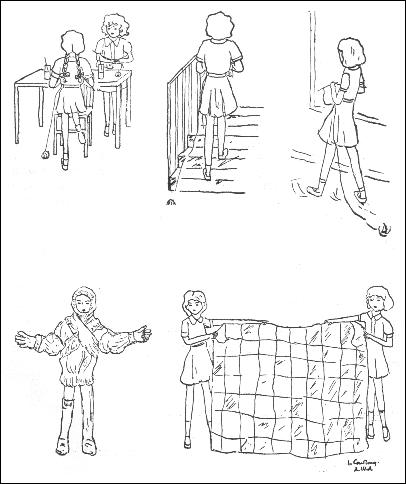 South Accommodation Road School, with which the Guild has been so happily associated for many years, has changed its identity and so it was necessary to readjust the Guild's activities. It was decided unanimously that our main effort should be concentration upon knitting for the Forces, but that our work for Dr. Barnardo's Homes and the collections should be carried on as before.
South Accommodation Road School, with which the Guild has been so happily associated for many years, has changed its identity and so it was necessary to readjust the Guild's activities. It was decided unanimously that our main effort should be concentration upon knitting for the Forces, but that our work for Dr. Barnardo's Homes and the collections should be carried on as before.
Although pocket money was rather scarce, with the help of money already in hand, enough was raised to buy a little wool. The girls on the whole were very keen, and many knitted articles were sent to men serving in His Majesty's Forces.
Since our return to Lawnswood the Guild of Help has had a very busy session. The demands on our pockets have been rather great, but we are quite willing to make a sacrifice, however small it may be, to help cheer up the members of the fighting forces and those less fortunate than ourselves. There have been collections for the Finnish Refugee Fund, St. Dunstan's, Polish Refugee Fund, Mine Sweepers, and an egg collection in both kind and money. The school has been very pleased to join with all children of the Empire in an Empire Day collection for tobacco for the men who are protecting us. Dr. Barnado's League has continued its work with unimpaired energy. The Five Million Club exists although in a slightly different form. The money is being invested in land, to be used as playing fields after the war, and to provide play things for needy evacuee children.
The major activities of the society have been in Knitting Circles. In order to have a constant supply of money to buy wool with, the majority of girls have pledged themselves to give either a penny or a half-penny per week. The Lady Mayoress has very kindly supplemented our wool supply with some of hers. We feel very grateful to her, and were very honoured when she paid a visit to our Circle on 30th May. With great pride we are able to announce that we can call ourselves a sub-depot of the Navy and of the Air Force.
A very creditable number of garments have been knitted, and we hope to swell the number during the coming months.
May I take this opportunity of thanking first Miss Wallace and Miss Watson, who were Secretary and Treasurer respectively, and Miss Williams and Miss Bradbury, who took over their work in September, as well as all other members of the committee. We do thank them very much indeed for all the work they have so readily and willingly done for the Guild of Help.
ROWENA BROOKE.
Number of Garments knitted up to date:
| Helmets, 47. |
Scarves, 33. |
| Jerseys, 2. |
Seaboot Stockings,
4 pairs. |
| Gloves, 10 pairs. |
Socks, 38 pairs. |
| Mittens, 60 pairs. |
Wristlets, 10 pairs. |
| Red Cross Bags for
Hospitals, 83. |
Blankets, 54. |
80 more garments in process.
3 parcels have been sent to the Lady Mayoress.
3 parcels have been sent to the Navy.
3 parcels have been sent to the Air Force.
Seeking safety in Ripon but back home by Christmas
As the girls of Lawnswood High School in Leeds broke up for the summer holidays, their books were taken from them and sent down for storage in the basement. At home, each girl already had her essential clothes and enough food for one day packed and ready to go. The year was 1939 and another major war was coming. The Munich Agreement of the previous September had failed to curb Adolf Hitler's expansionist plans. Quite the reverse, in fact. The policy of appeasement and Prime Minister Neville Chamberlain's 'peace in our time' speech had served only to earn the Führer's contempt and increase his confidence.
On Friday, 25 August, although we were still at peace with Germany, the Lawnswood girls were obliged to cut short their holiday and return to school to prepare for evacuation. On 1 September, as the Germans were storming into Poland, 175 of them were hurried off to seek safety in Ripon. Their young and recently appointed headmistress, Miss Melicent Holden, ('Milly' behind her back) and the teachers who had volunteered to accompany them did their best to keep up the girls' spirits, but it must have seemed at that time as though the whole country were on the move. Three million people were forced out of our big industrial cities and on to the mercy of strangers in the rural areas. Most of these were youngsters, bewildered and labelled like parcels. Clutching their few possessions and with gas masks in strong, cardboard boxes slung around their necks or over shoulders, they wept for their equally distressed parents.
Trainloads of Leeds children arrived at the old railway station on Ure Bank that day. They were issued with brown carrier bags of 'iron rations' and waited nervously to find out where they would be staying. Miss Holden had been assured that those from Lawnswood would all be billeted 'in proximity', but this was more easily said than done.
It is interesting to note that the Ripon Gazette and Observer of the day reported reluctance on the part of some citizens, notably the better off, to make room for anyone at all. Three Lawnswood girls, presumably unwelcome at the family table, were fed separately in the servants' dining room. The lady of the house, having been coerced into taking them in, was later fined for turning them out again. In an attempt to justify her action, she insisted that one of the trio was showing symptoms of mumps and might infect her staff!
Fortunately, most families were willing to help, even though many homes were already overcrowded and the small allowance promised for each evacuee could scarcely have made up for the inconvenience. In the scramble to get to see everyone settled, it is small wonder that mistakes were made. One Lawnswood girl never forgot being left on a doorstep in Blossomgate to await the return of her new hosts. Unaware they were away on holiday, she sat there for hours, grateful that her 'iron rations' included biscuits and chocolate. I should add that she was eventually rescued and taken in by neighbours of the absent family.
Miss Holden, who joined the committee of an association formed to secure the welfare of evacuees, was determined that her pupils should suffer as little as possible from the disruption to their education. She was grateful to accept Ripon High School's offer of the use of its classrooms each afternoon and its playing fields on some mornings. Homework was done in church premises in Blossomgate and Allhallowgate and any time left over was filled with reading every available newspaper, solving crossword puzzles, story telling, letter writing, knitting and sewing. One girl recalled making an early start on Christmas presents for her nearest and dearest.
Ripon was never actually bombed, but one of the first lessons the Lawnswood girls learned was what to do when the air-raid sirens started to wail. At school, this was to crawl underneath a desk and hope for the best until the 'All Clear' sounded. They were painfully aware that nothing could protect them from a direct hit, but the desks would at least have offered some protection from flying glass. At night, they had to join their hosts in the safest places available, which ranged from a cupboard under the stairs to an Anderson Shelter in the back garden.
Far from being disheartened by their strange situation, they thrived on it. Much of this was due to the generosity of the Ripon High School girls, who went to a lot of trouble to make them feel welcome. Despite having to give up their desks to the newcomers and carry their own books to and fro each day, they willingly took part in sports matches between the two schools and held form parties on Saturday afternoons. Anxious parents in Leeds received enthusiastic accounts of treasure hunts, dancing and competitions. The Lawnswood girls in their navy-blue tunics and white blouses soon became a familiar sight around the city. Letters in the school magazine tell of botany lessons in the Spa Gardens and walking in form groups through the fields to Studley Park and Fountains Abbey. One girl recalled the fun of crossing the river on stepping stones, a pleasure denied on health and safety grounds, I must assume, to today's visitors. Budding historians were shown around the Cathedral by its organist, Dr Moody, who patiently explained the significance of different styles of arches, windows and woodwork. Visits to the Wakeman's House on the Market Place and Ripon Museum in Thorpe Prebend House were also enjoyed.
Although Ripon, then as now, had a large military presence, knitting socks, scarves and gloves 'for the war effort' was probably the closest that most of the Lawnswood girls came to the men of the armed forces. Miss Holden and her colleagues kept a strict eye on their charges and it is doubtful whether many found opportunities for flirtation. If they did, they kept it to themselves and I can well understand why. Miss Holden's steely blue eyes could still stop a wayward girl in her tracks when I joined the school twenty years later on.
As the days shortened and the blackout was rigorously enforced, there were plenty of indoor pursuits to enjoy. A Campfire Group and Guide Company were set up specifically for the Lawnswood girls. In addition, some older Guides were invited to join the local Ranger Company. Preparations for two shows also took up a great deal of their spare time. Keen to repay the kindness shown to them in Ripon, the Senior Choir sent to Leeds for some costumes, made others with the assistance of the staff and put on Gilbert and Sullivan's Yeoman of the Guard (pictured above). Despite a hitch at the dress rehearsal, when the Tower of London collapsed on top of some of the Yeomen, the show was a great success and raised £10 for the Red Cross and Moral Welfare funds.
Other girls produced the Lawnswood pantomime, in which the Babes in the Wood and Aladdin, ably assisted by Fairy Blackout, defeated the swastika-bearing Demon King. The audience was entertained to songs including What shall we do with our Latin Grammars? and the Lawnswood Trot, which lampooned the 'convoy system' that saw the girls, equipped with torches and luminous bands, safely back through the blackout to their billets.
The months between Chamberlain's declaration of war on 3 September 1939 and the spring of 1940 became known as 'the phoney war' To most ordinary people at least, very little of military importance seemed to be happening in Western Europe and many evacuees went back to their families. The Lawnswood girls were glad to return home in time for Christmas, but they took with them many happy memories of their four months in Ripon.
In her foreword to the 1939-40 Lawnswood High School magazine, Miss Holden, a lady highly respected by generations of girls for practising what she preached, wrote:
It is the privilege of a few of us to serve our country directly, but for most women and girls service means watching and waiting and carrying on cheerfully with everyday things, even if these become increasingly more awkward and difficult. It is in these days of grief and trial that our traditions are tested and that we pray that we may each maintain the courage and resolution, the kindliness and generosity, the spirit of
co-operation that we began to learn at school and must continue to practise all our lives, in war as in peace. If we can holdfast to these things we need not be ashamed of the quality of our service nor have any fear for the future.
The Lawnswood evacuees were proud not to have let her down.
Do you have any stories to tell about being evacuated from Lawnswood to Ripon? Did your family live in Ripon and house any of the Lawnswood girls? If so, please contact lhs.alumnae@gmail.com
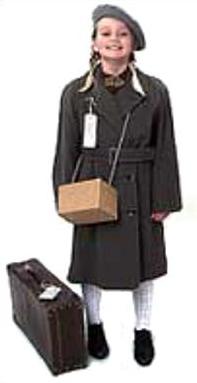
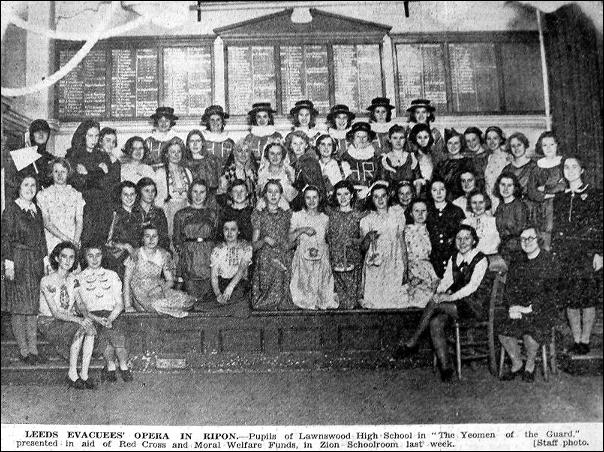
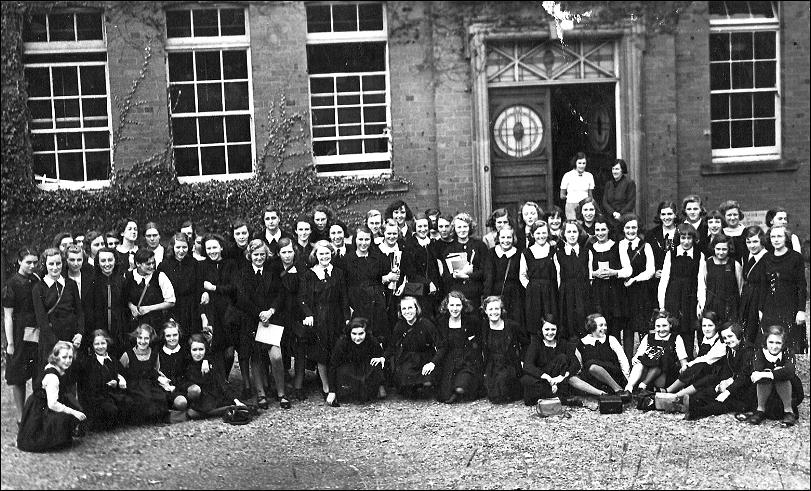
 and at home we each of us had a haversack stuffed with the essentials of clothing; and food for a day. The order to prepare for evacuation came on Friday, August 25th, and many of us had to return home early from holidays to report at school. The following week we attended school daily, anxiously awaiting the signal which did come exactly a week later, on September 1st.
and at home we each of us had a haversack stuffed with the essentials of clothing; and food for a day. The order to prepare for evacuation came on Friday, August 25th, and many of us had to return home early from holidays to report at school. The following week we attended school daily, anxiously awaiting the signal which did come exactly a week later, on September 1st.
 during those first days (or afterwards either) who was not armed with some kind of handwork.
during those first days (or afterwards either) who was not armed with some kind of handwork.
 We were fortunate to see some, a little distance away, feeding under some trees.
We were fortunate to see some, a little distance away, feeding under some trees.
 a platform at one end on which stood an obviously well used piano. Every week-day morning the Senior School trooped in, in twos and threes, and were ready for work by 9-30 a.m. We then did as much homework as had been set and spent the rest of the morning in recreation of various sorts.
a platform at one end on which stood an obviously well used piano. Every week-day morning the Senior School trooped in, in twos and threes, and were ready for work by 9-30 a.m. We then did as much homework as had been set and spent the rest of the morning in recreation of various sorts.
 Babes in the Wood who were hunting for a billet. She also ensnared, with the aid of some not very "dainty and charming fairies", the Demon King into marriage, "a prospect drear."
Babes in the Wood who were hunting for a billet. She also ensnared, with the aid of some not very "dainty and charming fairies", the Demon King into marriage, "a prospect drear."
 South Accommodation Road School, with which the Guild has been so happily associated for many years, has changed its identity and so it was necessary to readjust the Guild's activities. It was decided unanimously that our main effort should be concentration upon knitting for the Forces, but that our work for Dr. Barnardo's Homes and the collections should be carried on as before.
South Accommodation Road School, with which the Guild has been so happily associated for many years, has changed its identity and so it was necessary to readjust the Guild's activities. It was decided unanimously that our main effort should be concentration upon knitting for the Forces, but that our work for Dr. Barnardo's Homes and the collections should be carried on as before.
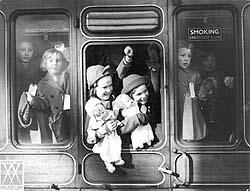 When the day arrived (most of the pupils did go) and we had to report to the railway station, complete with a label, a very small case (only one change of clothing allowed) and of course the inevitable gas mask in its cardboard box, with a string to go over one's shoulder. This had to be taken everywhere we went. Rumours abounded - was it Knaresborough (where was that?) and eventually we were told that we were going to RIPON - not so far away. Ripon turned out to be full of troops and Irish navvies!
When the day arrived (most of the pupils did go) and we had to report to the railway station, complete with a label, a very small case (only one change of clothing allowed) and of course the inevitable gas mask in its cardboard box, with a string to go over one's shoulder. This had to be taken everywhere we went. Rumours abounded - was it Knaresborough (where was that?) and eventually we were told that we were going to RIPON - not so far away. Ripon turned out to be full of troops and Irish navvies!
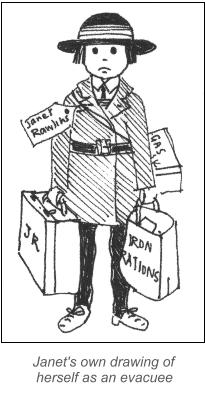 This September term would be my first in the 'big school' having just come up from the Kindergarten. There was nobody at all from my form. When we arrived in Ripon we were given brown carrier bags of "Iron Rations". There were things like tins of sardines and beans, which I thought were a sort of iron, and biscuits and chocolate. I thought this must be all we would have to eat in the war.
This September term would be my first in the 'big school' having just come up from the Kindergarten. There was nobody at all from my form. When we arrived in Ripon we were given brown carrier bags of "Iron Rations". There were things like tins of sardines and beans, which I thought were a sort of iron, and biscuits and chocolate. I thought this must be all we would have to eat in the war.
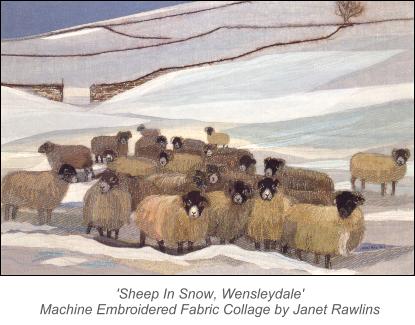 Then one night I overheard heard the people talking to Joan and Evelyn. They had not expected to have three evacuees so were asking Evelyn if she would move to the Minister's house next to the chapel. The Minister and his wife had two children, a boy and a girl. Evelyn didn't want to leave; she said, "Why can't Janet go? She likes boys." (At home I had only boys to play with so it was true!) So I shouted down the stairs that I didn't mind moving. Evelyn and Joan were about fourteen and didn't really like having an eight year old around.
Then one night I overheard heard the people talking to Joan and Evelyn. They had not expected to have three evacuees so were asking Evelyn if she would move to the Minister's house next to the chapel. The Minister and his wife had two children, a boy and a girl. Evelyn didn't want to leave; she said, "Why can't Janet go? She likes boys." (At home I had only boys to play with so it was true!) So I shouted down the stairs that I didn't mind moving. Evelyn and Joan were about fourteen and didn't really like having an eight year old around.